PRINCETON, NJ -- A new Gallup poll finds Americans' views of the job the Internal Revenue Service is doing skewing much more negative than in the past, with 42% saying the IRS is doing a poor job, up from 20% in 2009 and 15% in 2003. Meanwhile, positive ratings of the IRS have declined 14 points since 2009, from 40% to 27%.
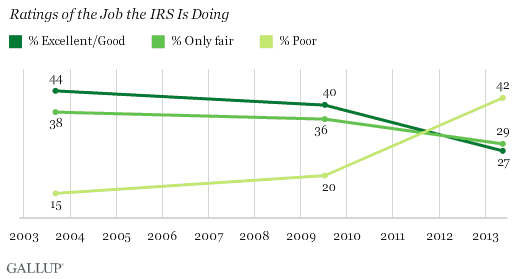
These results are part of a May 20-21 update of a Gallup trend on Americans' ratings of nine major federal government agencies. The poll was conducted at a time that the IRS has received harsh criticism for allegedly singling out conservative-leaning groups for greater scrutiny when they applied for tax-exempt status. The decline in the IRS' image has left it as the only agency of the nine receiving a net negative rating.
Americans are most positive toward the Centers for Disease Control and Prevention, and the FBI. Apart from the IRS, the agencies with less positive images are the Federal Reserve Board and the Environmental Protection Agency.
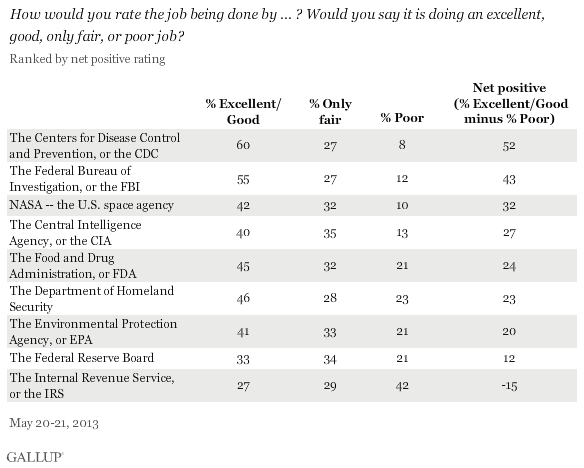
It is notable that Americans are on balance positive toward most of the government agencies, given their overwhelmingly negative views of the federal government more generally.
Since Gallup's last update of government agency ratings in 2009, the image of the IRS has suffered the most, with its net rating down 35 points. NASA's image has also declined, but -- unlike the decline for the IRS -- this is not because its "poor" ratings have increased. Rather, fewer Americans give NASA an "excellent" or "good" rating, while more give it a "fair" rating or have no opinion of the job it is doing, likely because NASA has not been in the news as much lately since the space shuttle program ended.
The FBI, CIA, and Department of Homeland Security have all suffered slight drops in their net ratings, while ratings of the Food and Drug Administration and the Federal Reserve have improved slightly.
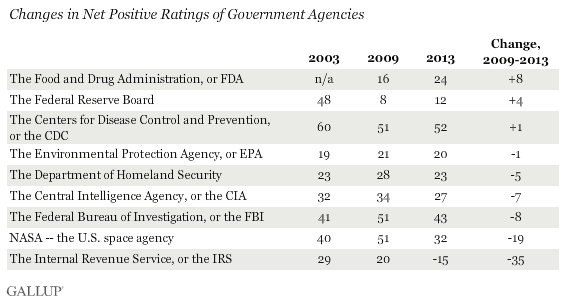
Since 2009, the image of the IRS has worsened among all major party groups, but the decline has been steepest among Republicans. Democrats alone maintain more positive than negative views of the IRS, perhaps because the current controversy has emerged under a Democratic administration. Notably, ratings of the IRS were fairly similar by party in 2003, but they have declined among independents and Republicans in each subsequent update.
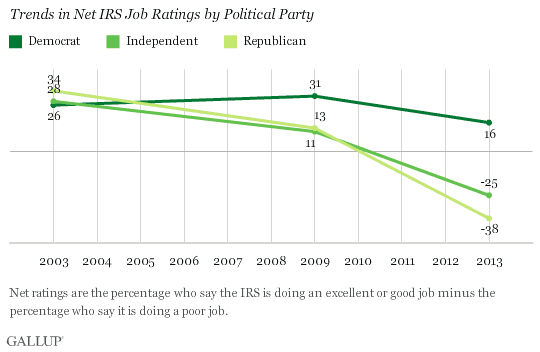
IRS Power Has Long Been Viewed Skeptically
In accord with Americans' negative views of the IRS, the public is also critical of the power the IRS has and the way it uses it. Currently, 62% of Americans say the IRS has more power than it needs and 60% say it frequently abuses its powers.
But those attitudes are not necessarily new or unique to the recent controversy. Americans were also skeptical of IRS power in 1997, the last time Gallup asked these questions. That was amid a congressional investigation into IRS fairness, leading to a public apology by the IRS commissioner for the agency's policy of targeting low-income taxpayers -- people less able to fight back -- for audits and retrieval of back taxes. In fact, at that time, Americans were even a little more skeptical about the IRS' use and abuse of its power than they are now.
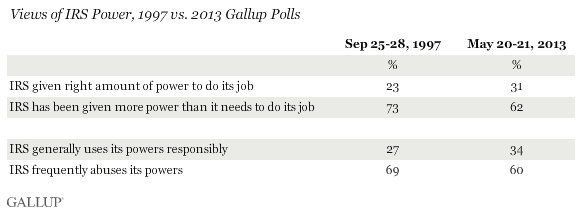
Although the 1997 controversy also occurred under a Democratic president, the public's views then were less polarized, with all parties similarly critical of the agency. Now, Democrats are more positive toward the IRS, including a majority who say it uses its power responsibly.
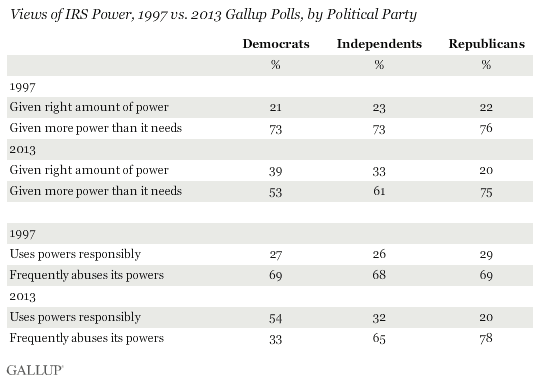
Bottom Line
The IRS' image has clearly suffered in recent years, and although the nearly four-year period between Gallup updates makes it difficult to ascribe the change directly to the recent controversy, this almost certainly has been a major factor. Over that same period, most other government agencies' images have been more stable, with some showing slight improvement and others a modest decline in their job ratings. And as recently as four years ago, Americans viewed the job the IRS was doing more positively than negatively.
Thus, the IRS has much work to do to repair its image, which will likely need to wait until the matter over its alleged targeting of conservative groups is fully investigated and dealt with. But given that Americans have viewed the agency positively in the past -- even as they expressed skepticism about the power the IRS has -- it is not out of the question that its image could recover, or at least improve, in the future.
Survey Methods
Results for this Gallup poll are based on telephone interviews conducted May 20-21, 2013, on the Gallup Daily tracking survey, with a random sample of 1,016 adults, aged 18 and older, living in all 50 U.S. states and the District of Columbia.
For results based on the total sample of national adults, one can say with 95% confidence that the margin of sampling error is ±4 percentage points.
For results based on the sample of 523 national adults in Form A and 493 national adults in Form B, one can say with 95% confidence that the margin of error is ±6 percentage points.
Interviews are conducted with respondents on landline telephones and cellular phones, with interviews conducted in Spanish for respondents who are primarily Spanish-speaking. Each sample of national adults includes a minimum quota of 50% cellphone respondents and 50% landline respondents, with additional minimum quotas by region. Landline telephone numbers are chosen at random among listed telephone numbers. Cellphone numbers are selected using random digit dial methods. Landline respondents are chosen at random within each household on the basis of which member had the most recent birthday.
Samples are weighted to correct for unequal selection probability, nonresponse, and double coverage of landline and cell users in the two sampling frames. They are also weighted to match the national demographics of gender, age, race, Hispanic ethnicity, education, region, population density, and phone status (cellphone only/landline only/both, cellphone mostly, and having an unlisted landline number). Demographic weighting targets are based on the March 2012 Current Population Survey figures for the aged 18 and older U.S. population. Phone status targets are based on the July-December 2011 National Health Interview Survey. Population density targets are based on the 2010 census. All reported margins of sampling error include the computed design effects for weighting.
In addition to sampling error, question wording and practical difficulties in conducting surveys can introduce error or bias into the findings of public opinion polls.
View methodology, full question results, and trend data.
For more details on Gallup's polling methodology, visit www.gallup.com.
